Recent Posts
Top Locations for Where Water Damage Occurs | SERVPRO of Walker & Winston Counties
12/13/2023 (Permalink)
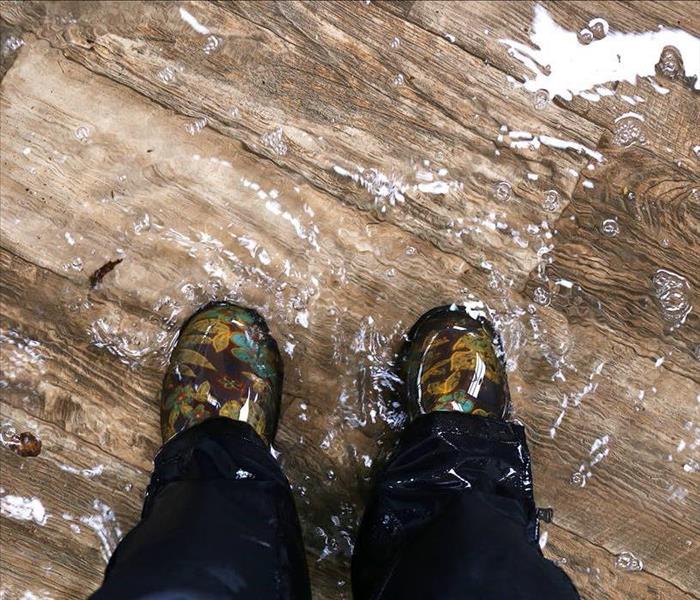 Water damage won't last for long in your property when you call SERVPRO of Walker & Winston Counties!
Water damage won't last for long in your property when you call SERVPRO of Walker & Winston Counties!
How many of your appliances do you rely on to get through your busy week? How many of them rely on water to function? Whether you are loading up a dishwasher for what feels like the thousandth time or clinking ice into your drink, you are constantly surrounded by water in your home.
While that easy access to water allows us to get more things done around the house with less effort, the risk of suffering water damage as a result of a malfunction or leak is always present. Knowing where to look and what to do if you do discover water damage can help you stay in control.
Where to Look
One of the first obvious places to check for water damage is anywhere that is directly connected to the outside elements. Windows, doors, skylights and vents can all experience cracks, gaps or sagging that can invite water inside your home. Run your hands over your window panes and check around your doors for new puddles after every rain.
Other common locations are leaky pipes or loose water connections around your home. A single deteriorating seal that connects your water pipe to your kitchen sink can slowly start to drip and then turn into a gush of water. The same goes for any exterior water lines. A dripping spigot that continually drips onto the ground near your foundation can eventually leak down and into your home via a tiny gap or crack in your concrete foundation.
Your Appliances
Any appliance that relies on water to function also can leak or malfunction at any time, leading to serious water damage in a short amount of time. Routinely pull your washing machine and dishwasher out from the wall to check behind and beneath them for signs of water damage or water spots. You should also keep up with routine maintenance on these machines to reduce your risk.
If you do discover a water leak coming from your appliance, stay calm! Simply shut off the appliance and then head to your utility room to shut off power to the area. If your water valves are in your utility room, turn off the appropriate water valve as well. If not, head back to the room that the leak occurred and look for the water valve leading from your appliance and close it.
The next step is to get us on the phone!
Why a Professional Restoration Matters
Water has the innate ability to leak and seep into the tiniest of cracks and crevices and can get behind walls or under floors instantly. If your water leak travels to places that are hard to dry out on your own, it can quickly cause structural integrity issues and even spark large mold infestations.
Our team can arrive quickly and stop all this from happening! We will remove the standing water, dry out excess moisture and tackle repairs all at once so you can recover faster and more completely. Don’t wait! Call us as soon as you discover water damage.
Spotting water damage should always prompt a call to SERVPRO of Walker & Winston Counties. Contact us today.
Tips for Extinguishing House Fires Fast | SERVPRO of Walker & Winston Counties
12/13/2023 (Permalink)
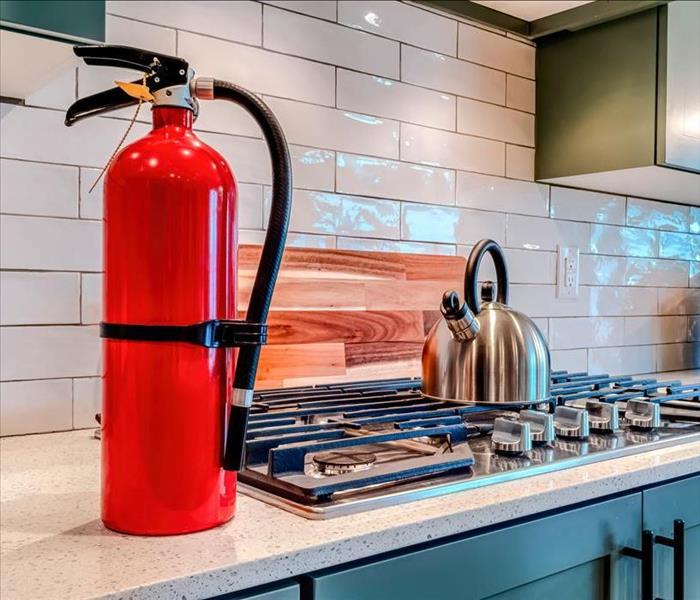 Keep these fire safety tips from SERVPRO of Walker & Winston Counties in mind this holiday season!
Keep these fire safety tips from SERVPRO of Walker & Winston Counties in mind this holiday season!
We all spend a lot of our days in the kitchen making meals whether you are a gourmet chef or survive on mac and cheese cups. Cooking is an essential part of life, and a lot of that cooking relies on heat in order to be prepared properly.
Because of that, it should be no surprise that most house fires start in the kitchen. They can happen at any point without much warning, so knowing ahead of time how to put out a fire can help you stay in control and avoid serious home damage.
Kitchen Safety
Once a fire starts in the kitchen, it will grow quickly and start to consume anything in its path. One reliable fire prevention strategy is to limit the number of flammable materials and objects in your kitchen. Keep pot holders, oven mitts and wooden utensils stored in a safe location until you need them, and keep your sleeves rolled up while you work.
Keep a lid nearby when you are cooking that you can easily toss over a growing flame. If a spark flares up or a flame from your burner gets bigger than you intended, popping a lid over the flame can remove the oxygen it needs and the fire will die out.
Remember, fire and grease do not mix well, so using water should never be an option for kitchen fires. You should always smother a grease fire.
Reacting to a Fire
If you are cooking away and a fire breaks out, use your lid right away if the fire is small or reach for your fire extinguisher if it quickly grows beyond your pan. Pull the pin and sweep it over the flames. If the fire starts in your oven, keep the door shut and turn off the oven while you wait for the fire to slowly smother itself.
All of these extinguishing methods should only be used if you feel comfortable staying to fight the fire. If you ever feel unsafe or unwilling to stay, back away and call 911 as you make your way outside. Stay low below any smoke that has started to fill the room and get out the quickest way you are able.
How SERVPRO® Can Help
Once the fire department arrives and takes control of the situation, the flames may be extinguished but your home may be in ruins. Fire can quickly cause significant structural damage as well as water damage due to the water used to put out the fire. Get us on the phone right away so we can get started on your restoration.
Our talented team will handle your entire recovery from the initial debris removal to the final structural repairs. We can rebuild rooms or sections of your home with ease while we focus on cleaning, sanitizing and removing stubborn odors. We always have your back when it comes to fire damage recovery.
Call us as soon as your house fire is extinguished. SERVPRO of Walker & Winston Counties is here to help you recover.
Tips for Tackling Mold at Your Business | SERVPRO of Walker & Winston Counties
12/13/2023 (Permalink)
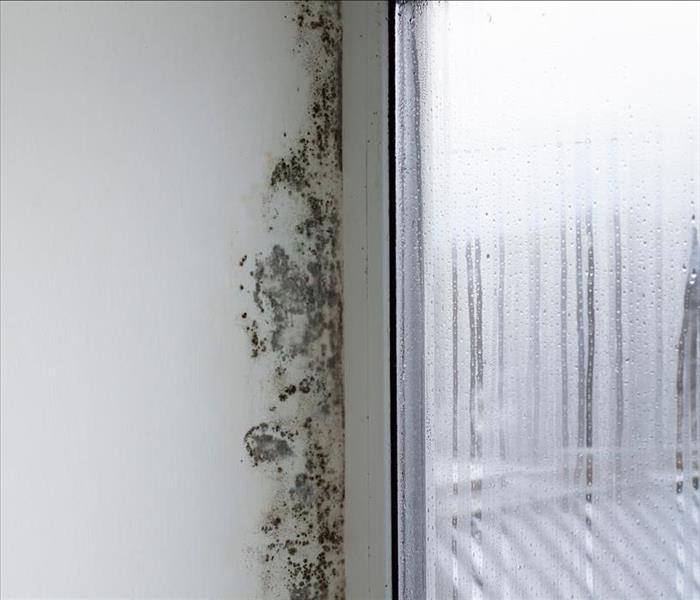 Don't let mold take over your property! Call SERVPRO of Walker & Winston Counties to remove the fungi.
Don't let mold take over your property! Call SERVPRO of Walker & Winston Counties to remove the fungi.
We all take pride in our businesses and work hard every day to provide the best quality product or service for our community. After all, that’s what fills up our cups as business owners!
We all want what’s best for our businesses day in and day out, so it can be especially frustrating to deal with the unexpected or discover something like a mold infestation on a seemingly regular day of the week.
Our team is here to help get your business back on its feet! One of the services our commercial cleaning crew offers is commercial mold remediation, and we will help you recover quickly and efficiently.
Where Mold Grows
Every building and business is different, but most often the areas of your building that experience moisture issues are in your attic, basement and bathrooms. Mold thrives in dark and damp areas, which are coincidentally places that you don’t often travel to on a typical day at work.
If you run down to the basement to grab an old piece of equipment or head into the attic to inspect a fan and are hit with a musty odor, it’s time to do some investigating.
An unaddressed water leak could have sparked the mold infestation or lingering humidity from an inefficient attic space could have been the culprit. Either way, do not disturb the mold colony. Some mold shouldn’t be inhaled and you could actually make the problem worse by trying to clean it up yourself. Call SERVPRO of Walker & Winston Counties commercial services division instead!
How We Can Help
We will identify the emergency contact for the project as soon as you call us and then we will ask our follow up questions to ensure we fully understand the extent of the situation. Once we arrive, we will don protective gear and then head to the location to inspect the mold and identify the type and reason for the infestation.
We will get to work containing the area like shutting off all fans and your HVAC system to stop the airborne transfer of particles and then we will filter the air to capture any microscopic spores out of the air. Our air scrubbers really get to work during this part of the mold mitigation process! Then we will give the entire area a thorough cleaning and use our antimicrobial treatments to ensure the mold cannot grow back.
Why Restoration Might Occur for a Mold Problem
Mold made up of many different mold spores that will continue to grow and thrive at your business until the problem is discovered. Because of that, the mold colony could wind up growing in your building for days, weeks and months before it is identified! Over that period of time, mold can start to degrade drywall, subfloors and other building materials that can impact the safety of your building.
Once your space is clean, we will be able to address any structural repairs to ensure your building is a safe place for all of your staff and/or customers. Our goal is to help you completely recover from a mold infestation so your building can function smoothly and remain a safe space for everyone under your roof.
Got mold? Contact SERVPRO of Walker & Winston Counties today.
Top Storm Threats to the Jasper Area | SERVPRO of Walker & Winston Counties
12/13/2023 (Permalink)
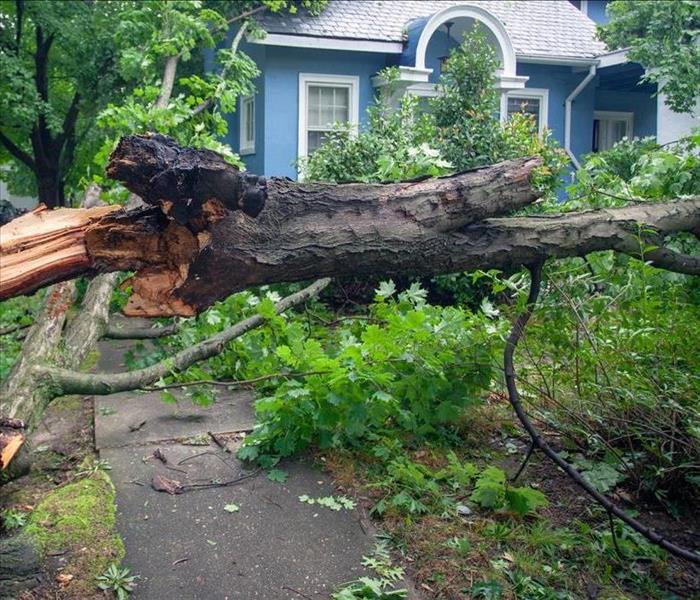 When disaster strikes, call SERVPRO of Walker & Winston Counties to help clean up faster.
When disaster strikes, call SERVPRO of Walker & Winston Counties to help clean up faster.
We all know how serious storms can be in our community! The spring and summer can be a volatile time of year, but strong storms can impact us at any point throughout the different seasons.
Knowing more about the different weather threats and what damage they can cause can help you better prepare your home and family to keep everyone safe and dry while the weather rages outside.
When the Wind Blows
Wind is often one of the most destructive parts of a storm because it holds incredible power. Moderate thunderstorms can bring wind speeds up to around 30 to 40 miles per hour, and that speed can snap twigs and toss around yard debris easily.
More severe storms that bring wind speeds upwards of 70 miles per hour or more can break limbs, knock over trees and even turn over cars or other heavy outdoor equipment or possessions.
Getting your home ready as soon as high wind is predicted can help you avoid serious impact damage. Trim your trees to remove dead branches, get your car inside the garage and tie down anything heavy that you don’t want to be blown into the sides of your home.
When the Rain Starts to Fall
Rain may not seem like a serious part of any storm, but it can infiltrate your home and create a watery mess or flood in seconds. A single blocked gutter can lead to water pooling on your roof that will force its way under your shingles and into your home. Once it is in your attic, it can leak down your walls or become stagnant and spark a mold infestation.
It can also get into your home down below via a foundation issue. If your gutters are full and rain pours over the edge of your roof and directly onto your foundation, it can easily seep down through the ground and get into your basement through tiny gaps and cracks in your foundation. This can lead to soggy carpets, wet walls and a host of other flood-related problems.
The Dangers of Tornadoes
When a tornado warning is issued, taking cover immediately is necessary. Tornadoes can cause incredible amounts of damage and can lead to entire neighborhoods being leveled. Stay away from windows and locate an interior room of your home to ride out a tornado warning.
If your home is damaged by the wind or power generated by a tornado, use extreme caution when walking about in your home after the storm has passed. Broken boards, bent nails and shattered glass are all serious safety hazards.
Let us help you overcome any sort of home damage that you suffer during a storm. Our team will be there quickly to help dry out your home and address repairs right away.
Our team can confidently handle your storm restoration. Contact SERVPRO of Walker & Winston Counties today.
Mold In the Crawlspace
1/19/2023 (Permalink)
The south is known for its year-round humidity. Here in Alabama, we know this is to be absolutely true. If your structure is built over a crawlspace, chances are, at some point, you have seen mold in there. Excessive rain can cause the ground to become moist and if there is not a vapor barrier in your crawlspace, that moisture from the ground can evaporate into the crawlspace creating very humid conditions.
High humidity in crawlspaces can increase the chances for mold growth on the building materials such as the subfloor, joists, and beams. One of the first warning signs is a strong musty smell; this can mean that there is mold nearby.
Mold is something we take very seriously because of the risk of continuing damage if the source is not taken care of. Most of the time, water damage is the root of mold beginning to form in, or under a structure. Our goal is to contain the affected area to reduce spores from traveling to unaffected areas. We will run dehumidifiers and air scrubbers to assist with the drying and restoration process. These machines help control the environment until the problem is resolved.
Should you find mold, or what you think is mold in your crawlspace, contact your local SERVPRO mitigation team to help your structure back to preloss condition. We are always here to help.
It's Busted Pipe Season in Walker and Winston Counties!
12/22/2022 (Permalink)
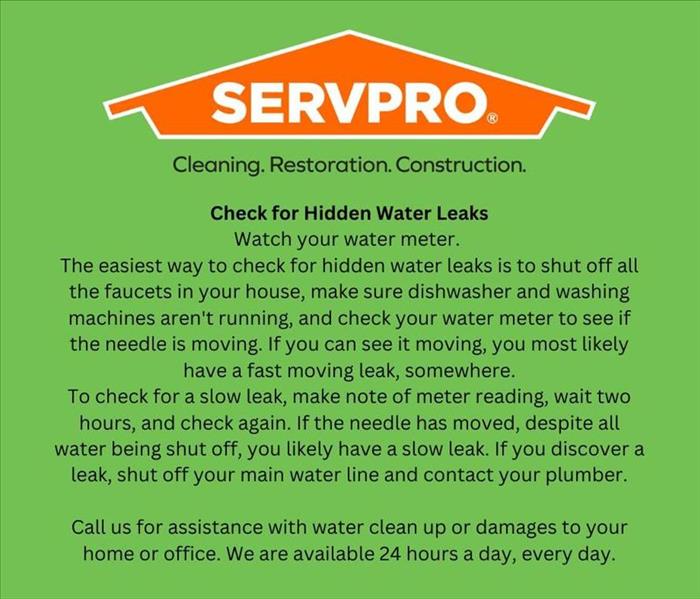 Busted Pipes
Busted Pipes
Busted pipes can wreak havoc and spell disaster in a commercial building. It is important to have to protocols in place to get the water turned off and cleaned up as quickly as possible.
The #1 priority when a pipe burst, is to get the water turned off ASAP. After the supply has been turned off, open up every faucet to drain the remaining water from the lines. Also turn off the water the heater and flush every toilet at least one time. Once these objectives have been completed, the next phase can begin.
Step #2 is to reduce secondary damage. This is done by getting the water removed from the structure in a timely manner. Water will continue to move through building materials as long as it is present. If there is any doubt that water ran through an area that contains electricity, turn off the power at the breakers and consult an electrician to perform an inspection.
Step #3 is to contact a certified mitigation specialist such as SERVPRO. Even though you may have removed the standing water, there will still be elevated moisture levels and humidity. It is crucial to make sure that moisture levels and humidity are returned to preloss levels to reduce the risk of mold forming.
Should busted pipes cause water to infiltrate your building, call SERVPRO today to let us help you get your business back in working order.
Tips to Help Prevent Home Fires
8/17/2022 (Permalink)
We have all seen the pictures; devastation, loss of precious memories, family heirlooms, etc. House fires are, unfortunately, all too common. But there are steps we can take to help lower the rick of fires in our homes. Step one, always install fire and smoke alarms. Preferably with flashing lights, if available. Check them monthly, if you worry that the batteries are weak, install fresh ones as our family is not worth the worry
over a few dollars and a fresh set of batteries. Step two, never smoke in bed. If you enjoy tobacco, enjoy it in a safe place, not in your bed. Step three, keep your grills, and other outdoor cookers at least 5-feet away from the walls of your home and 5-feet away from nearby brush, trees, etc. Step four, have fire
extinguishers stored throughout your home, on all levels. Step five, never, ever, leave a heater on when you leave a room. There are countless, documented stories of floor and portable heaters causing home fires, and in some cases, death. Step six, just as important, never leave candles burning unattended. See step number five. Step seven, if you're cooking in the kitchen, stay with it. Remember, a large percentage of fires originate from the kitchen. Step eight, use child-resistant lighters, matches and keep these items stored securely. Step nine, if an appliance smells strange, call a service tech immediately. Step ten, have a qualified electrician check your house wiring. This can take place annually, or every few
years, but get it done just to be sure. Step eleven, have your chimney services/checked annually, especially if you and your family enjoy cooler weather fires in the house, and while you're at it, have an HVAC technician check your homes heater annually as well. A well tuned heating system is not only more safe, it is more efficient and saves money too.
Fire Safety Tips
7/22/2022 (Permalink)
There are several steps you can take to help ensure the safety of you, your family and your pets, in the case of a fire. First, install fire/smoke alarms on every level and certainly outside of sleeping areas. Second. have a family plan for escape. Review this plan at least twice a year to keep everyone on top of the situation. Keep in mind, as noted, this exercise only takes a few minutes, and in the event of a real fire emergency, in most cases, you only have a few minutes to escape. This is important in the fact that, if a fire occurs, everyone knows exactly what to do, their scape plan and if necessary, the plan to evacuate elderly family members, pets, etc. Third, test your fire/smoke alarms monthly. Batteries do run-down, malfunction, etc. Knowing your fire/smoke alarms are fresh and functional, will give you piece-of-mind and help everyone sleep better knowing they are protected in case an emergency does arise. Lastly, never, ever go back into a burning structure. Get out, stay out and do not risk going back in. Do not re-enter the facility until the site has been cleared. Also, broken glass, damaged furniture can produce sharp wood, plastic, glass edges, flooring can collapse, causing a major slip/fall possibility. There can also be electrical danger present, and this along with the water damage from putting the fire out can pose electrical shock hazards. Call for help immediately, dial 911. Check on your family and those that were in your home. It is important to help and tend to those that might be injured and are in need of medical assistance. Contact your insurance agent/company. Find a safe place to stay, and also inform family and friends of your situation and tell them you are safe.
Commercial Cleaning Tips
7/22/2022 (Permalink)
Springtime cleaning is a regular tune we have all heard as the warmer weather brings in sunny days and
springtime showers. Flowers and trees begin their springtime blooming, and a general, "I can't wait to get
outside," feeling hots many of us. With a lot of us being couped-up for the winter, dust, allergens,
bacteria, pet-dander, etc., simply begin to show more. A clean environment is more welcoming and can lead to more customers
feeling comfortable in your place of business as well. See below for a few ideas on cleaning your
commercial facility.
Let's start with the outside.
Landscaping - Making the outside of your business look good is just as important as the inside. It's all about presentation! Now is not the time to let the weeds take over. Start by mowing the grass, pulling/spraying the weeds, clearing-up the brush over-hang and some tree trimming if needed. Also, if you like to add color, plant some flowers, or flower pots around the area; fresh blooms always brighten
the day. Windows - Squeaky clean windows not only provide a clear view through to your customers and guests,
they also look good as opposed to gritty, dirty windows. Check caulking around the windows; this is a major factor letting cool air out in the summer and warm air out in the winter. While your at it, check the
window seals. Make sure the windows provide what they were manufactured to do, a tight fit that won't
allow air to escape and won't allow water to seep-in.
HVAC - test run your system while the air outside is pleasant. Make sure there are no unfamiliar smells.
Check for worn-out parts that need replacement. Also, change the filter(s) if needed. A good idea is to
check the vents as well. Have the dust/debris build-up removed, and check for any pests that might have
taken up a home in your system. It's easier to have the pests taken care of then to put it off, and have to
close your business while its fumigated or fogged.
Don't forget the inside! Have the carpets cleaned, especially the high-traffic areas. Customers walking
thru your business can create dirt build-up on carpets and floors. Have the furniture, desks, chairs, etc.,
all cleaned and dusted off too.
Avoiding Broken Water Pipes
7/22/2022 (Permalink)
As we all know and understand, winter and cold temperatures can cause pipes in your home to burst. As the colder weather steps-in, and temps drop across the nation, those that experience regular freezing temperatures are more susceptible to busting pipes and damage throughout the home/facility. There are
a few tips to help prevent this from happening.
In fact, freezing temperatures can significantly increase the odds of bursting pipes, and this is one of the most common causes of property damage to homes across the country. The most vulnerable pipes are those running thru unheated interior spaces, and those that back-up to an exterior wall. Even those that run thru cabinets and exterior walls can freeze as well. There are some simple steps to take that can significantly improve your odds and avoid broken water pipes.
Open kitchen and cabinet doors, this allows the warmer air to circulate around and in the plumbing areas
that are usually closed-off. Do this especially if your kitchen sink is up against an exterior wall. Always be sure to remove ANY chemicals/cleaners if you have any small children or pets in the home. Keep garage doors closed; some homes have plumbing pipes running thru the garage areas. Let cold-water drip from a faucet, keep your thermostat at no less than 55-degrees, and consider insulating your pipes from the cold air.
So, for not much more than a cup of coffee at a fast food restaurant, you can avoid the headache of broken water pipes, the clean-up involved, the loss of precious keep-sakes and your insurance
deductible. Definitely something to consider before Father Winter comes to town.
 Water damage won't last for long in your property when you call SERVPRO of Walker & Winston Counties!
Water damage won't last for long in your property when you call SERVPRO of Walker & Winston Counties!

 24/7 Emergency Service
24/7 Emergency Service



